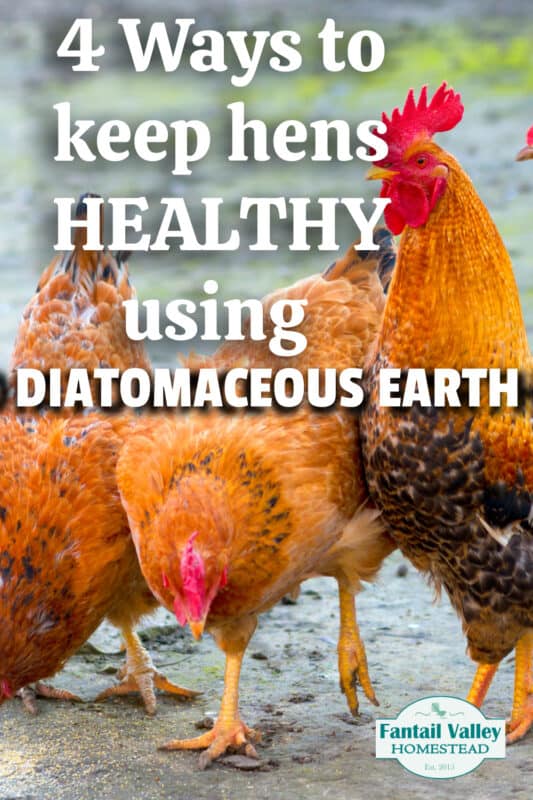-
Internal Parasites
DE can also be used to control internal parasites in chickens. These parasites can cause a variety of health problems for chickens, including diarrhea, weight loss, and even death.
To use DE for internal parasite control, simply add it to their feed or water. The DE will work to dehydrate and eliminate any parasites that may be present in the chickens’ digestive systems. It is important to note that DE should be used as a preventative measure and not as a treatment for an already infected flock.
How to use DE to treat internal parasites in chickens
When using diatomaceous earth (DE) as a dietary supplement for chickens, the recommended amount to add to their food or water is about 1-2 tablespoons per 50 pounds of feed or the same amount in 10 gallons of water. This amount can vary depending on the quality and purity of the DE you are using, so it’s best to consult the manufacturer’s instructions for specific dosage recommendations.
It’s important to note that DE is a desiccant, which means it absorbs moisture. It is best to add DE to the feed or water just before serving it to the chickens, as prolonged exposure to DE can cause the feed or water to become less palatable.
When using DE as a dewormer, it’s recommended to add it to the feed for at least 7-14 days. It seems that DE works by absorbing the oils and fats from the worms, causing them to dehydrate and die.
It’s essential to use food-grade DE, as the other types of DE may contain crystalline silica, which can be harmful if ingested.
-
In the Coop
DE can also be used in the coop to keep it clean and free of parasites. Sprinkle DE on the floor and in the nesting boxes to absorb moisture and odors.
DE can also be used to control pests such as ants, roaches, and bed bugs. Simply sprinkle DE around the base of the coop and in any cracks or crevices where pests may be entering.
Dangers and downs sides to using Diatomaceous Earth with Chickens
While diatomaceous earth (DE) is generally considered safe for chickens and can provide many benefits, there are a few potential downsides to be aware of when using it.
One potential downside is that DE can be abrasive and may irritate the respiratory system of chickens if it is inhaled in large amounts. To avoid this, it is important to use food-grade DE and to avoid applying it in areas where chickens will be spending a lot of time, such as in their coop or in a closed area.
Another potential downside is that DE can be harmful to beneficial insects such as bees and ladybugs. If you are using DE to control pests in your chicken coop and you also have beneficial insects in the area, consider using a less abrasive method of pest control.
Additionally, DE doesn’t discriminate between beneficial and harmful insects so it’s important to make sure that the chickens are not consuming DE in large quantity as it could lead to health issues if ingested.
Finally, it’s worth mentioning that DE is not a registered pesticide, it’s not a complete solution for pest control and it’s not a replacement for proper coop sanitation and biosecurity practices.
Overall, DE can be a useful tool for controlling pests and improving the health of chickens when used correctly, but it’s important to use it carefully to avoid potential downsides.
Lime vs diatomaceous earth for chicken coops?
Both lime and diatomaceous earth (DE) can be used to benefit chickens and their coops, but they have different properties and uses.
AGRICULTURAL LIME
Lime, specifically hydrated lime, is a type of calcium carbonate that can be used to raise the pH level of the coop’s environment, making it less hospitable to pathogens and parasites.
Lime can also be used to dry out the coop and reduce odors. It is typically added to the coop’s bedding or mixed into the soil of the run.
Lime can be harmful if inhaled and care should be taken when handling it. It’s also important to note that it should not be used in the same area where the chickens will be feeding, as the high pH can cause digestive issues if ingested.
DIATOMACIOUS EARTH
DE, on the other hand, is a natural powder made from the fossilized remains of tiny aquatic organisms called diatoms. It is most commonly used as a natural pest control, as the sharp edges of the diatoms can cut through the exoskeletons of common chicken pests such as mites and lice, effectively killing them.
DE can also be used to prevent and treat external parasites such as mites and lice. It can also be used as a natural dewormer, and a way to improve overall chicken health and maintain a clean coop. DE can be added to the coop’s bedding or mixed into the chickens’ feed.
Lime can be used to raise the pH level of the coop and make it less hospitable to pathogens and parasites, while DE is a natural pest control, a parasite preventative and treatment, a natural dewormer, and a way to improve overall chicken health and maintain a clean coop. Both can be used in a chicken coop, but it’s important to use them correctly and to follow all the safety precautions to avoid any potential issues.
In conclusion, Diatomaceous earth is a versatile, natural and effective way to keep chickens healthy and happy. Whether you’re using it as a dust bath additive, treating mites, controlling internal parasites or keeping the coop clean, DE is a valuable tool for any chicken owner. Remember to use food grade DE and always consult a veterinarian before starting any treatment.


